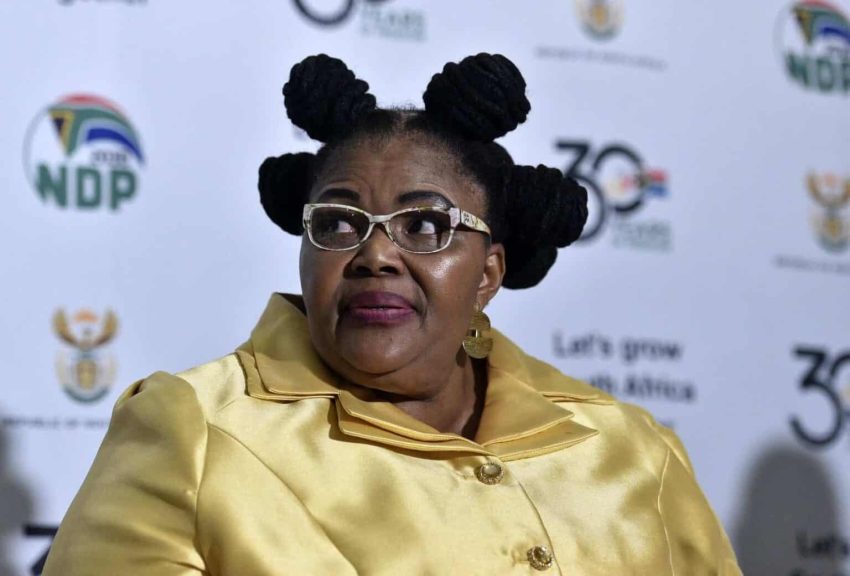Many regions across the country continue to face water challenges.
The uMkhonto weSizwe (MK) party is demanding the resignation of Water and Sanitation Minister Pemmy Majodina.
This comes after Majodina, in her written reply to the MK party, revealed that the board chairpersons of several water entities received substantial payments for attending a limited number of meetings.
MK party spokesperson Nhlamulo Ndhlela said collectively, board members across the country are draining nearly R50 million a year in board fees despite most municipalities facing constant water challenges.
Why MK party wants the minister to go
At uMngeni-uThukela Water, Advocate Vusi Khuzwayo earned R1.4 million for just 13 meetings, with an additional R179 000 in travel expenses.
Trans-Caledon Tunnel Authority (TCTA) chairperson Precious Sibiya received R1.2 million for 10 meetings, while Lepelle Northern Water’s Dr Nndweleni Mphephu was paid more than R1 million for the same number of meetings, plus R139 000 in travel.
Magalies Water chairperson Keneilwe Sebego earned R920 000 for 13 meetings and R67 000 in travel and Amatola Water’s Pam Yako received R934 000 for 21 meetings, along with R70 000 in travel costs.
“This is not an administrative lapse but a gross abuse of power, manipulation of public funds and a betrayal of the people,” said Ndhlela.
According to Ndhlela, some board members had violated a directive not to exceed board hours without approval.
Declaring gifts
He said their actions violated the Public Finance Management Act (PFMA).
“Some members claimed four to six hours of preparation per meeting on top of the stipends, indicating a deliberate scheme to inflate hours,” he said.
In some cases, board members allegedly received expensive gifts that they did not declare.
“Whistleblowers confirmed receipt of leather bags worth ±R6 000 and other branded gifts, none of which were declared, breaching the Board Charter and King IV Guidelines,” he said.
ALSO READ: Government calls for calm after volatile protests over water in Westbury
Claiming board hours
He said that some members allegedly claimed board hours while billing private clients, potentially constituting possible criminality under section 86 of the PFMA.
“If these water boards were functioning effectively, there would be no need for protracted water shedding or the rolling outages now devastating communities.
“Instead, KwaZulu-Natal, Eastern Cape, Gauteng and Free State are suffering weeks-long outages, collapsing wastewater plants and raw sewage spilling into rivers.
“Funds that should have repaired infrastructure have been diverted to gala dinners, luxury travel and ministerial briefings.
“This is water capture: oversight boards have been turned into personal ATMs,” he said.
DA demands transparency
In a statement on Tuesday, the DA also expressed concern about the payments being made to the water board chairpersons and members.
“While the department argues that these amounts are in line with approved policies, that does not make them right or fair to the millions of South Africans currently without basic services,” said DA MP Stephen Moore.
Moore said the department must publish each entity’s fee policy, per-meeting rates, add-ons (travel/prep/committees), attendance and totals for the 2023-24 financial year.
Water and sanitation department responds
In a written statement to The Citizen on Thursday, Department of Water and Sanitation spokesperson Wisane Mavasa said all board fees are determined in accordance with their remuneration policy.
She said these policies were developed through an independent comparative study of remuneration of boards in the public sector and approved by the minister.
“This policy is reviewed and adjusted annually in line with the consumer price index (CPI).
“Different hourly rates apply depending on the size of the water board. The hourly rate is determined by the size and annual budget of the water board using an internationally accepted and recognised grading and linked remuneration methodology,” said Mavasa.
She said the hourly rates vary between R1 818 per hour for the chairperson of a large water board and R1 150 per hour for a board member of a small water board.
“These rates are much lower than the average rates paid to members of boards of comparatively sized companies in the private sector,” she said.
According to Mavasa, most of the board members are professionals in fields such as finance, accountancy, law, engineering and science.
“The hourly rates paid to board members are in line with the rates that the board members would charge if they were practising as professionals in their industries.
“For example, a senior professional accountant charges between R1 500 and R2 500 per hour,” she said.
NOW READ: Fixing SA’s water woes means curtailing municipalities’ free-spending ways
